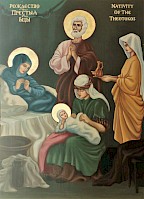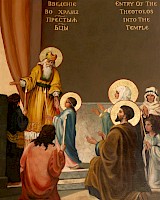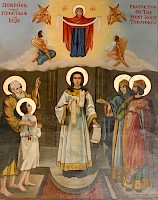Литургические циклы
Great Lent and Pascha
The Feast of Feasts the Holy Pascha the Resurrection of the Lord-is the climax of the Church's liturgical year and is also the most glorious, most joyful and bright festival of the Christian Church. On it Our Lord and Savior Jesus Christ arose as victor over death, destroying the power of death over man once and for all and annulling the curse pronounced upon man in Paradise. But, before the bright joy of Pascha, the Church has ordained a lengthy period of repentance and spiritual searching a period of preparation, so to speak the 40-day Great Lent.
The Forty Days of Great Lent commemorates Israel's forty years of wandering in the Wilderness the forty years of painful struggle as Israel longed for and then received entrance into the Promised Land (Ex. 16:35) Moses remained fasting on Mt. Sinai for forty days (Ex. 34:28) and the Prophet Elijah fasted for forty days as he journeyed to Mt. Horeb (1 Kings 19:8). Great Lent also recalls the forty days the Lord spent in the Wilderness after His Baptism, when He contended with Satan, the Temptor.
The time of Great Lent encompasses forty days, to which must be added Lazarus Saturday, Palm Sunday and Passion Week. In addition, the Holy Church prescribed three weeks of preparation for the Great Lent itself the Sundays of the Publican and the Pharisee, Prodigal Son, Meatfare and Cheesefare. In all, the Orthodox Church prescribes ten weeks of spiritual and bodily preparation for the joyous Pascha of the Lord.
Pentecost
The Descent of the Holy Spirit (50th day after Pascha)
On the 50th Day after Pascha, the Holy Church celebrates the Feast of the Descent of the Holy Spirit (Holy Pentecost). When the Day of Pentecost had come, they were all together in one place. And suddenly a sound came from heaven like the rush of a mighty wind, and it filled all the house where they were sitting. And there appeared to them tongues as of fire, distributed and resting on each one of them. And they were all filled with the Holy Spirit and began to speak in other tongues, as the Spirit gave them utterance (Acts 2:1-4).
Nativity Fast
The Nativity of Our Lord God and Savior Jesus Christ (Dec. 25 / Jan. 7)
In the earliest days of Christianity, the Feast of the Nativity of Christ was not generally celebrated in the Church. First mention of the Feast is made by Clement of Alexandria, who mentions that certain Egyptians commemorated the birth of Christ on May 20. The Apostolic Constitutions of the first half of the 4th Century set forth that January 6 should be celebrated as both the Feast of the Nativity and Epiphany. St. Gregory of Nyssa in 380 wrote that the faithful of Cappadocia celebrated the Nativity on Dec. 25. The Feast was not celebrated in Jerusalem until the 6th Century, while St. John Chrysostom introduced it at Antioch in 386 and at Constantinople between 398-402. In Rome the Feast of the Nativity of Christ had been celebrated on Dec. 25 since 354.
Apostles’ Fast
The Holy Apostles Peter and Paul (June 29 / July 12)
From the 4th Century on, the Church of Rome has celebrated the Feast of the Holy Apostles on June 29 / July 12. This became the usage of the Universal Church. Spiritually the Feast is linked with Holy Pentecost, as the witness of the Apostles is the immediate fruit of the descent of the Holy Spirit which came upon them. The Feast is preceded by the Fast of the Holy Apostles which begins on the Monday following All-Saints' Sunday (1st after Pentecost). The two most important Apostles of the early Church were Peter and Paul and, according to Church Tradition, they were both martyred in Rome, Paul by beheading and Peter by crucifixion. Thus this Feast became especially prominent in Rome.
Although St. Peter had a special zeal concerning Christ and is considered the chief of the Apostles, he did not have any special authority over the other Apostles, but was only first in honor. When there were important questions in the Church, it was a Church council that decided them, and St. Peter himself was sent by a council to preach the Word of God.
According to St. John Chrysostom, St. Paul sought dishonor more than we seek honor, death more than we seek life, poverty more than we seek wealth, sorrows more than we seek joy, and that he prayed for his enemies more than others pray against their enemies. For him there was only one thing to be feared: that he might offend God! He desired nothing more in life than to please God and the whole meaning of his life was his love for Christ.
Dormition Fast
The Dormition of the Most-Holy Theotokos (Aug. 15 / Aug. 28)
Liturgically, the most important Feast of the Theotokos is that of her Dormition or Falling-Asleep. Prior to this Feast there is a strict two-week fast, beginning on August 1, which is broken only by the Feast of the Transfiguration on August 6. This Feast possesses two distinct aspects inseparably linked in the mind of the believer. On the one hand, there is death and burial and, on the other, resurrection and the assumption of the Mother of God. As part of the Inner Tradition of the Church, this event was mystery that was not designed for the ears of the outside world, but which was revealed to the faithful within the Church.
Lives of the Saints / Other Feast Days
- The Nativity of the Most-Holy Theotokos (Sept. 8 / Sept. 21)
- The Universal Exaltation of the Life-Creating Cross (Sept. 14 / Sept. 27)
- The Entrance of the Theotokos into the Temple (Nov. 21 / Dec. 4)
- The Nativity of Our Lord God and Savior Jesus Christ (Dec. 25 / Jan. 7)
- The Holy Supper
- The Theophany of Our Lord God and Savior Jesus Christ. (Jan. 6 / Jan. 19)
- The Meeting of Our Lord Jesus Christ in the Temple (Feb. 2 / Feb. 15)
- The Annunciation to the Most-Holy Theotokos (Mar. 25 / Apr. 7)
- The Transfiguration of Our Lord and Savior Jesus Christ (Aug. 6 / Aug. 19)
- The Dormition of the Most-Holy Theotokos (Aug. 15 / Aug. 28)




Church Services
A major cycle which involves the entire life of an Orthodox Christian is the daily cycle of prayers and praises offered by the Church, once every twenty-four hours. These services express our remembrance of events which happened at certain hours and contain petitions relevant to these memories.
In antiquity the day was considered to begin at sunset and thus was divided according to the following order. Night began at 6:00 p.m. (according to our reckoning) and was divided into four parts (called watches the time of changing guards): Evening (6:00 p.m. to 9:00 p.m.); Midnight (9:00 p.m. to 12:00 midnight); Cock-crow (12:00 midnight to 3:00 a.m.); and Morning (3:00 a.m. to 6:00 a.m.). Day began at 6:00 a.m. (our reckoning) and it, too, was divided into four watches (or hours). First Hour (6:00 a.m. to 9:00 a.m.); Third Hour (9:00 a.m. to 12:00 noon); Sixth Hour (12:00 noon to 3:00 p.m.); and Ninth Hour (3:00 p.m. to 6:00 p.m.).
Following this ancient pattern, Orthodox Christians begin each portion of the day with common prayer, which has resulted in the following eight Services, customarily divided into three groups: Ninth Hour, Vespers, and Compline; Nocturns (Midnight Service), Matins, and First Hour; Third and Sixth Hours. In addition to this daily pattern, in certain monasteries during certain periods of fasting, each of the Hours is followed by an intermediate Office called the Interhour. Also included in the daily cycle are the Offices for the Blessing of the Table and the Morning and Evening Prayers.
The Daily Cycle follows this pattern:
- Vespers (sunset)
- Compline (after-dinner) - also known as Apodeipnon
- Midnight Office (12:00am) - also known as Mesonyktikon
- Orthros (sunrise) - also known as Matins
- First Hour (6:00am)
- Third Hour (9:00am)
- Sixth Hour (12:00pm)
- Ninth Hour (3:00pm)
The services of the Daily Cycle are usually contained in a bound collection called the Book of Hours, also known as the Horologion (Greek) or Chasoslov (Slavonic).
Fasting
Paschal Cycle
- Meatfast the week before the beginning of Great Lent
- Great Lent and Holy Week
Yearly Cycle
- Nativity (St. Philip's) Fast Nov. 15 through Dec. 24 / Nov. 28 through Jan. 6)
- Apostles' (Peter and Paul) Fast from the Monday after All Saints Sunday through June 28 / July 12
- Dormition (Theotokos) Fast Aug. 1 through Aug. 14 / Aug. 14 through Aug. 18
Fast Days
- The Wednesdays and Fridays of the Year, except for Fast-free Weeks
- The Eve of Theophany / Kreschensky sochelnik Jan. 5 / Jan. 18
- The Beheading of St. John the Baptist Aug. 29 / Sept. 11
- The Elevation of the Cross Sept. 14 / Sept. 27
Fast-free Weeks
- Afterfeast of the Nativity of Christ to Theophany Eve Dec. 25 through Jan. 4 / Jan. 7 through Jan. 17
- The week following the Sunday of the Publican and Pharisee
- Bright Week the week after Pascha
- Trinity Week the week after Pentecost, concluding with All Saints Sunday
[Dates show: Gregorian Calendar (new) / Jullian Calendar (old style)]
SOURCE: Excerpt taken from "These Truths We Hold - The Holy Orthodox Church: Her Life and Teachings". Compiled and Edited by A Monk of St. Tikhon's Monastery. Copyright 1986 by the St. Tikhon's Seminary Press, South Canaan, Pennsylvania 18459.
To order a copy of "These Truths We Hold" visit the St. Tikhon's Orthodox Seminary Bookstore.


